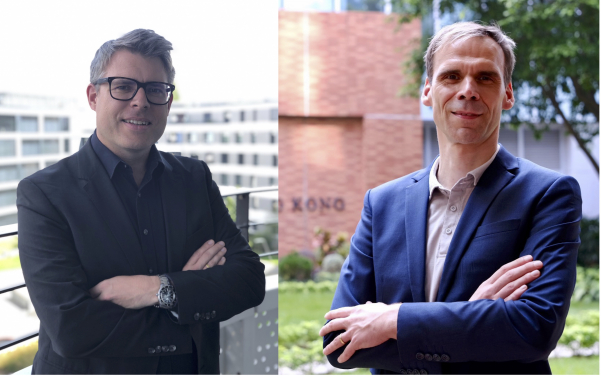Media
HKU State Key Laboratory of Brain and Cognitive Sciences provides a roadmap for unlocking the brain secrets of social media
09 Nov 2023
With nearly 5 billion users worldwide spending an average of over two hours daily on platforms like TikTok, Instagram, and Facebook, the impact of social media on mental health and well-being has garnered increasing attention. Concerns about excessive and problematic usage, particularly among vulnerable adolescents, have led to discussions around terms such as 'brain hacking,' 'dopamine trigger,' and 'social media addiction.' However, there is limited scientific understanding of the relationship between social media and the brain.
Professor Benjamin Becker, from the Department of Psychology and State Key Laboratory of Brain and Cognitive Sciences at the University of Hong Kong, collaborated with Professor Christian Montag from Ulm University in Germany to assemble an international expert team. Together, they called for promoting neuroscientific research to determine social media's effects on the brain, aiming to provide evidence-based information for policy makers, public health initiatives, and users. Their call to action was published in Trends in Cognitive Sciences entitled ‘Unlocking the brain secrets of social media through neuroscience’.
The team noted that despite a growing number of studies on the adverse impacts of social media on mental health and well-being, current understanding remains patchy and critically limited by the reliance on self-reported measures, where past studies have reported that people can exhibit subjective time distortions when estimating their online times.
During the last ten years, only a handful of studies have employed modern brain imaging technologies, i.e., Magnetic Resonance Imaging (MRI), to determine the impact of social media usage on the brain and studies in adolescents are scant. While these studies suggest that neural changes in motivational, affective and cognitive brain systems may mediate the detrimental impact of social media usage, interpretation of the findings remained strongly hampered by methodological shortcomings and the current findings do not allow a clear evaluation of the subject.
The researchers emphasized the need for evidence-based policy making, such as determining an appropriate age for platform access. They outline the following areas that are in urgent need of neuroscientific evidence:
1. Does excessive social media use share brain mechanisms of addiction?
2. Which emotional and motivational brain mechanisms keep users engaged and while they are spending time on social media?
3. How does social media use affect the adolescent brain and are there particular vulnerable time windows in adolescent brain development for the effects?
4. Does social media act as trigger of ‘dopamine’ a neurotransmitter in the brain related to pleasure and addiction?
Professor Becker concluded that “it is essential to support multidisciplinary research projects to determine the impact of social media on brain development and mental health in adolescents with the aim to develop brain-based strategies to strengthen resilience and improve the treatment of addictive behavior, psychosocial stress and depression in adolescents.”
Professor Montag added that “Social media has opened tremendous opportunities for communication, self-expression and social connection but social media should be redesigned to better protect and promote mental health and well-being”. This will ultimately require a better understanding of the brain mechanisms that keep users online and impact their well-being.
Link to the journal article: https://www.sciencedirect.com/science/article/abs/pii/S1364661323002528
Media enquiries:
Professor Benjamin Becker, State Key Laboratory of Brain & Cognitive Sciences (Email: bbecker@hku.hk)

